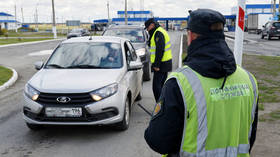Baltic state moves closer to confiscating Russian cars

Latvian lawmakers have backed a bill that would see vehicles with Russian license plates seized if they are not registered in the Baltic nation. The move comes after the EU issued recommendations last month on how member states should implement sanctions against Moscow.
The Latvian parliament on Thursday approved in a first reading amendments to the road traffic law, which would require Russian vehicles to be registered with the authorities or removed from the country within three months, once the legislation comes into force.
“If a Russian vehicle unregistered in Latvia is found to be used in road traffic after this deadline, it will be seized and confiscated. The confiscated vehicles are planned to be handed over to Ukraine,” a summary of the bill posted on the parliament’s website reads.
However, cars with Russian license plates would be permitted to cross Latvia in transit, as long as this is completed within 24 hours. Exemptions would also apply to vehicles used or owned by diplomats. Latvian lawmakers plan for the bill to enter force on November 15.
The authors of the measure cited the need to implement EU sanctions imposed on Russia over the Ukraine conflict, as well as to “reduce security risks,” without elaborating further.
Latvia has already barred Russian registered cars from entering its territory, joining several other European countries that have taken the step, including Estonia, Lithuania, Poland, Finland, Norway, Germany, and Bulgaria.
The measures came after the EU Commission issued a compilation of “frequently asked questions” in early September, explaining that Russians are not allowed to bring cars into the bloc regardless of “whether the use of the vehicles is private or commercial.”
EU officials have also pointed out that restrictions apply to imports of a wide range of personal items, including hygiene products, although they recommended that national authorities implement them in a “proportionate and reasonable manner,” noting that the primary goal is to prevent sanctions evasion.
Russian Foreign Ministry spokeswoman Maria Zakharova denounced the ban on imports of personal items as blatant “racism.” She also condemned the vehicle entry ban as “not just another attempt to rebuild the Iron Curtain in Europe, but the true renaissance of Nazism and its various neo-forms.”













